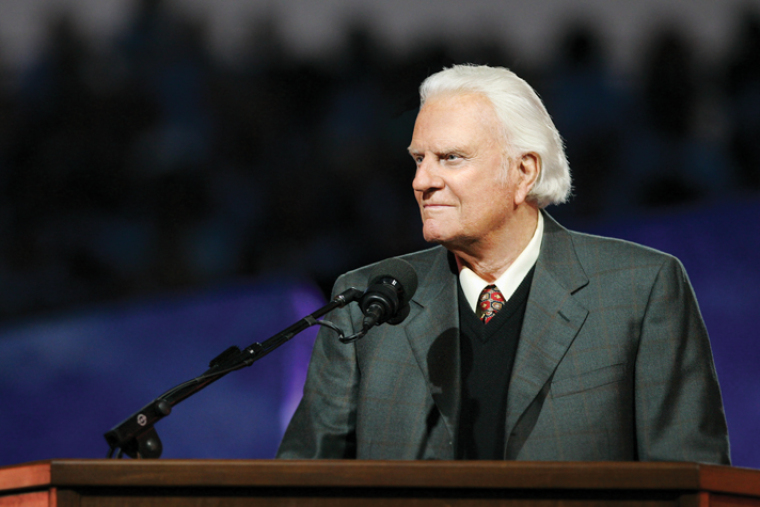Stone cold: Atheists don't want statue of Billy Graham at U.S. capitol

RALEIGH, N.C. (Christian Examiner) – The North Carolina General Assembly has passed a bill that will place a statue of evangelist Billy Graham in the National Statuary Hall of the U.S. Capitol, if the selection is approved by a congressional committee.
In April, the North Carolina House passed House Bill 540, a bill recognizing Graham's legacy of preaching to 215 million people in more than 185 countries and territories and as many as 2.2 billion through television. The bill was passed by the Senate last week.
The bill also states Graham has been "a renowned humanitarian and philanthropist," counseled a dozen U.S. presidents, and participated in nine presidential inaugurations.
"Reverend Graham has also counseled world leaders and has participated in many historic occasions, and has been called upon as the 'nation's pastor' during times of national crisis," the bill reads.
Despite supporters' insistence that Graham is a universally beloved figure, he has a checkered history, including anti-Semitism, disdain for atheists, and other alienating and divisive views. Further, he is a religious figure who has no other redeeming secular achievements (such as Martin Luther King, Jr.).
A Wisconsin-based atheist group, however, is arguing that North Carolina Gov. Pat McCrory should veto the selection because it is just as divisive as the original statue Graham's likeness would replace – former North Carolina governor and confirmed white supremacist Charles Aycock.
The Freedom from Religion Foundation (FFRF) issued a statement Sept. 22 that said the group applauded efforts to replace the statue of Aycock, but it said replacing it with a statue of the evangelist – no matter how well known – "only swaps one divisive figure for another. North Carolina has far more worthy candidates."
"Despite supporters' insistence that Graham is a universally beloved figure, he has a checkered history, including anti-Semitism, disdain for atheists, and other alienating and divisive views. Further, he is a religious figure who has no other redeeming secular achievements (such as Martin Luther King, Jr.)," the statement said.
Among the figures FFRF believes would be suitable substitutes for Graham are poet Maya Angelou -- since only nine of the 100 statues in the hall are female -- or the black civil rights lawyer Julius Chambers.
In April, when the North Carolina House first passed its bill authorizing the statue of Graham, FFRF's co-president Laurie Annie Gaylor wrote a letter to Gov. McCrory decrying the choice.
"It must be recognized," Gaylor wrote, "that choosing one of Christianity's most well-known figureheads to symbolize a secular state inevitably sends a message of exclusion and religious endorsement."
"Billy Graham is indeed a well-known North Carolina citizen, but fame alone is not enough to be honored as a symbol of the state in the National Statuary Hall Collection. Rather, a worthy candidate should represent the values of tolerance, honesty, open-mindedness, and inclusivity, not exclusivity."
According to guidelines for the National Statuary Hall, a person's statue can only be installed posthumously. A state may place two statues, each representing "a citizen of the United States ... illustrious for historic renown and for distinguished civic or military services." The rules also allow states to make changes to the statues in the hall.
The North Carolina bill creates a seven-member panel to identify a sculptor for the statue of Graham. One member of the panel will be a representative from the Billy Graham Evangelistic Association.
RELATED ARTICLE: